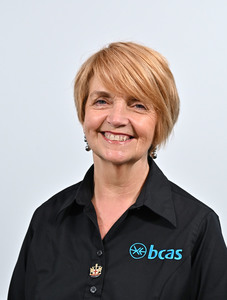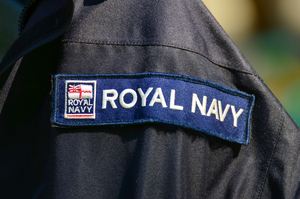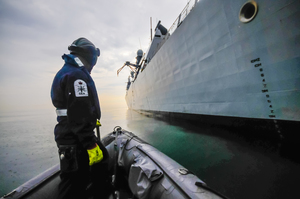

|
Edward Lowton
Editor |


|
| Home> | Industry update | >Company news | >Part of the family |
Part of the family
17 October 2025
LEAVING THE military to pursue a civilian career can feel daunting, but the compressed air industry has already proved a perfect fit for many veterans.

Frances Marsh, society administrator at the British Compressed Air Society (BCAS) is working with members to encourage them to sign up to the Armed Forces Covenant - a new commitment from the Society and its members to those who have served.
The Covenant is a commitment from BCAS and its members to the Armed Forces Community. It acknowledges and understands that the armed forces, and their families, should be treated with fairness and respect in the communities, economy and society they serve with their lives.
Providing meaningful support to ex-military personnel
BCAS signed the covenant in a ceremony held in April this year at Blighmont Reserve Centre in Southampton, and a number of its members have already followed suit.
Through its Armed Forces Working Group, the Society aims to provide meaningful support to ex-military personnel as they transition to a career in civilian life.
The compressed air industry is diverse. It requires specific technical and engineering skills to specify, commission and maintain equipment. It also offers a broad range of other career opportunities in sales and customer service, logistics and administration to name a few.
Encouraging veterans to consider the compressed air industry
"We know that military experience will equip individuals with many of these skills that are in demand in our sector. Through our working group, we hope to encourage more veterans to consider a career in the compressed air industry," Marsh explained.
"In return, we want to play our part in helping veterans as they transition into a role in civilian life, by offering fulfilling career opportunities; a transition which can be difficult for many. We are therefore encouraging all our members, and the wider compressed air community to consider the benefits that employing military personnel could bring to their business."
To learn more about BCAS’s commitment to the Armed Forces, visit the company’s website at armedforces.bcas.org.uk
To find out more about the Armed Forces Covenant, visit www.armedforcescovenant.gov.uk
A career in the compressed air industry: An Army veteran’s perspective
After 14 years in the Army, Jason Chapman found settling into civilian work hard. With six jobs in the first 12 months, the Royal Engineer veteran, now turned business development manager for Atlas Copco, explains how the compressed air industry finally helped him feel at home.
"Army life gave me structure. I gained a broad spectrum of knowledge and technical skills but when I retired, I just couldn’t find the right place to put these skills to good use," said Chapman
Transitioning to a civilian workplace
"I had a string of jobs over the first year and I even tried setting up my own business, but nothing could replace the camaraderie and the sense of working together as a team. Like a lot of veterans, I was probably quite poor at promoting myself and explaining how my talents could be put to best use in a civilian workplace.
"I started to find my feet a little when I joined engineering consultants, WS Atkins, working my way up to become project manager. Finally, I’d found a role where I felt comfortable - aligning my team and planning jobs. It bought back a lot of the enjoyment I’d felt in the military."
Stepping into the compressed air industry
Another stint working for an M&E contractor put Jason under a lot of pressure so when he was approached by an agency that was recruiting a service manager role for Atlas Copco, he thought it was worth a try, even though he knew nothing about compressed air.
"I was a bit daunted heading into the interview, but I needn’t have worried as the interviewer was ex-Navy and was much more interested in my people management skills than what I knew about air compressors," he continued.
"Put simply, the skills we learn in the Army - keeping a clear head or finding a solution to fix a problem - are all transferable. It’s so rewarding to be putting everything I learnt in the military to good use.”
"11 years and three roles later, I honestly can’t see me working anywhere else. The compressed air industry has become my second family, and I truly believe that compressed air and military experience go hand in hand," Chapman affirmed.
A career in the compressed air industry: An RAF veteran’s perspective
Mark White, senior product manager at Parker Hannifin Manufacturing is celebrating his 35th year in the compressed air industry. But his working life started out very differently, as an electronics mechanic based at RAF Henlow.
With more than three decades’ experience in the field of air treatment, he is passionate about passing on his skills to the next generation and believes the sector offers huge potential to veterans seeking a career outside of the Forces.
Gaining recognition for specialist skills
When veterans look to make the switch to a civilian career, they often face a similar problem. Their specialist skills are not recognised by industry. This was certainly the case for White, who had to work hard to prove his qualifications to potential employers.
"My time in the RAF equipped me with a wide range of skills - from using the correct tools, to reading drawings down to component level fault finding to name a few. I was a fully trained electronics mechanic, yet when I left the military, the typical career path for many of my peers was to fix photocopiers," he explained.
"I knew my qualifications were more than suitable for the positions I applied for. However, they didn’t carry a recognised certificate, such as a BTEC or diploma, and companies seemed unable to understand how my skills could be applied to the world of engineering.
"Thankfully a family friend suggested I try the compressed air industry and the rest, as they say, is history! I joined the domnic hunter, lately Parker Hannifin business in March 1990 as an Applications Engineer and am proud to have worked there ever since.”
The benefits of a military background
White has held a range of roles in the company, from product management to market development to training and applications, with a speciality in food grade and pharmaceutical compressed air treatment.
"A military career can certainly give you an excellent grounding in key engineering fundamentals. It will often be the case that you are operating in a fast-paced environment where speed and accuracy are of the essence. You get used to working under pressure, where those softer skills of teamwork and good communication can really make a difference too," he stated.
"Compressed air is used throughout industry. It touches almost everything that is made and sold and offers a vast array of career opportunities. So even though those military skills may not come with an industry-recognised label, they are incredibly transferable.
"I’d encourage any veteran looking for an interesting and varied engineering role to put the compressed air and vacuum industry at the top of their list," White concluded.
A career in the compressed air industry: A Royal Navy veteran’s perspective
For Royal Navy Veteran, Nigel Palmer, military life runs in the family. Following in his father’s footsteps, he joined the Force in 1998 as a marine engineer and is now managing director of a thriving compressed air business, SCC Air Compressors UK.
The key to his success? Palmer puts it all down to the work ethic, drive and can-do attitude instilled in him during his eight years' military service.
Transitioning to a civilian career
"The transition from a military to a civilian career can be really tough for veterans. Certainly, when I left the Royal Navy, it's fair to say that I didn't have a particular career path in mind. Like everyone else, earning money and paying the bills was a priority. However, I also felt confident that the skills I had developed would stand me in good stead for a future engineering role," he explained.
"I used my enhanced learning credits during my resettlement training with the Careers Transition Partnership, which I put towards both 16th edition wiring regulations and refrigeration training. Looking back, this was a wise choice, and I secured a role with Domnick Hunter (now Parker Domnick Hunter) almost immediately. Working on process chilling equipment soon broadened out into the wider compressed air industry and, fast forward 18 years, I'm now proud to be managing my own team of engineers as managing director at SCC Air Compressors UK.
Embracing the skills veterans can bring
"I consider myself very fortunate to have found a route into the compressed air industry so early on, but not all my peers found it as straightforward. The quality and breadth of the skills, particularly our technical knowledge, that we had gained during our years of service weren't always recognised by industry. I had many friends that had to settle for security or logistics work because potential employers believed the military skillset more closely aligned with these roles.
"Thankfully, the industry mindset has changed considerably since 2007 and it's encouraging to see more employers now embracing the skills that veterans can bring. And it's not just the technical expertise either. In the military, you keep going until the task is complete or the problem is fixed, which I believe are essential attributes for anyone considering an engineering career.
"I'm proud to be part of the compressed air industry and its commitment to supporting veterans in their ongoing careers. It's an industry where our skills can be used with great impact - whether it's dealing quickly with equipment breakdown, commissioning a new installation or advising customers on new ways to improve efficiency and performance."
Tel: 0207 935 2464
- 'Uniform needs' – EU law
- Train to gain improved compressed air system efficiency
- Staying abreast of directive changes
- BCAS: GB/UK legislation update
- BCAS offers 25% discount on ISO 8573 air quality standard training
- CSCS card update: The current state of play
- Simple steps to compressed air energy savings
- Update From Europe
- Trade associations: Delivering benefits to members
- Improving compressed air practices to cut energy wastage
























